April 2023: Olive Tree

Volume VIII/Issue 1/April 2023


From The Editorial Desk
On the Asbury Revival
Let's keep all of this in perspective. First, what was going on at Asbury and these other places, including Samford, is undoubtedly, for the most part, a good thing. However, again, keeping things in perspective, even though lots of folks, even Catholics, are talking about people “being saved” at Asbury and these other places, no one is actually being "saved" at any of these venues, in the sense that no one is receiving the sanctifying grace of the Holy Spirit that a person receives through the Sacrament of Baptism - at which point they are then truly “saved”. And that's why I said this revival is a good thing, "for the most part". People are turning their lives towards Christ, yes. But, after the initial zeal wears off, what comes next?
Our world is in a very dark place - spiritually and morally speaking. Our secular society has abandoned God and abandoned belief in a Savior - or even the need for a Savior. And the ones who are feeling the results of that abandonment the most keenly - whether they are consciously aware of it or not - are our young people.
It seems that at Asbury, Samford, and all of these other campuses - and, hopefully, many more places still to come - there is an awakening...an acknowledging...of the deep spiritual hunger of the soul for its Maker...for its God. This longing for God will hopefully draw all involved into a deeper relationship with Jesus and the Father, through the Holy Spirit.
In order for that to happen, however, the emotion...the feelings...of the moment cannot be fixed upon as what is to be sought. The emotions and feelings one experiences at such a revival are fleeting. What is to be sought is a translation of the emotion of right now...that deep longing for Christ...into a life that is irrevocably changed. A life that is lived more in conformity with the will of God for that life. No longer can one believe as a Christian and live as a heathen. No longer can one walk the line between living for Christ and living for the world. One must choose sides.
And here's the thing, Catholics, we have the great treasures of the Church - the Sacraments, the Rosary, the liturgy, the devotions and novenas, and so much more - that will give one the grace, the strength, the fortitude to live a life devoted entirely to Christ. One cannot long be carried on a wave of emotion, no matter how powerful that emotion may be. One can, however, long be carried by frequent reception of the Eucharist, by frequent Confession, and by frequent adoration of our Lord and Savior in the tabernacles of our churches.
As I read one person's post on some Facebook page, or maybe it was in an article on the Asbury phenomenon, there was an accompanying picture of students standing in line in the rain - I believe at Samford University - for sometimes hours to get into the chapel to, as the writer explained, "experience the presence of God". As I read that, and looked at the picture, I thought, "You know, they could walk right into a Catholic Church - no need to stand in line for hours - and "experience the presence of God" in the Eucharistic Lord abiding in the Tabernacle.
It is incumbent upon us then, as Catholics, to look at this phenomenon and all the attention it is receiving, as an opportunity to plant seeds of our faith with those experiencing these emotions...these longings...as well as with those who are talking about these happenings, in the hope that the Holy Spirit will, in His good time, bring all of those souls longing for union with Him into the Church where they can actually experience it in this lifetime...union with the Body, and Blood, of Jesus Christ. Where they can, anytime they want, walk into a church and be, literally, in the presence of God.
We need not be craving what they are experiencing, rather, we should be cognizant of the fact that they are craving what we already have. The problem is, too many Catholics take what we already have for granted. Or, they are too uncomfortable to step out and share what they have with others who don’t have it. This, people, is an opportunity to evangelize. To share the fullness of the truth that we have in the Catholic Church with those who are longing to be in His Presence, to receive Him into their bodies and souls.
Now, please don’t take what I’m saying as some triumphalist Catholic musings: “Yeah, they may be having a ‘revival,’ but we’ve got the Eucharist.” It is not that at all. Or that I’m trying to downplay or dismiss what was happening at Asbury and elsewhere. Not in the least.
If one reads carefully what I wrote, the first thing I said was that this "revival" is a good thing and then I said I hope it happens in even more places. Why? Because the outward longing for God simply reveals the inward longing for God of the soul. All good. We need more public acknowledgment of that. So I was not saying, "Oh, revival...bad; Catholic Church...good." It wasn't an either this or that comment. Except, of course, when it comes to the Eucharist. Why did I mention the Eucharist?
W hat is going to happen to all of these young people when the fervor of the moment dies down? Will this experience be applied to their lives? Will it change their lives? Or, will it feel really really good for a short while and then they'll go back to living their lives as they were before? What if they want to keep this experience going, how are they going to do that? Where can they enter into the presence of the Lord in their daily lives, while struggling with school, with family, with work, with marriage? Where can they receive the Holy Spirit like this week in and week out?
One place, and only one place. The Catholic Church. Specifically, and most notably, the Eucharist. We have the most incredible treasures known to man in our Church, and we, as Catholics, generally don't share them. That is what this is all about. Are we going to leave these folks hanging...wanting more but not knowing how to get it...or will we share what we have and point the way to how they can continue to receive grace upon grace, and how they can continue to "experience the presence of God" over and over again?
“On the Asbury Revival” was not written by our circle of writers and was edited for use in the Vatican in Exile Olive Tree.

The Boomerang Affect Of Sin
The Passover of the Jews was at hand, and Jesus went up to Jerusalem. 14 In the temple he found those who were selling oxen and sheep and pigeons, and the money-changers sitting there. 15 And making a whip of cords, he drove them all out of the temple, with the sheep and oxen. And he poured out the coins of the money-changers and overturned their tables. 16 And he told those who sold the pigeons, “Take these things away; do not make my Father's house a house of trade.”
(John 2:13-16)
Anything seem odd to you?
What Jesus did here is in all three Synoptic Gospels—Matthew, Mark, and Luke. But here is what makes this scene stand out: it isn’t the same thing.
Think about this, Jesus cleared the temple of the money changers and those buying and selling. He made a scourge and then declared, “My Father’s house shall be called a house of prayer.” This happens in Matthew 21, Mark 11, and Luke 19—all on Jesus’ triumphant entry into Jerusalem, which we call Palm Sunday.
But this is totally different. This is not Palm Sunday. This is the beginning of His ministry. This is John 2, not John 19.
This is Jesus clearing the temple at the beginning of His ministry where the other gospels record Jesus clearing the temple at the end of His ministry.
What He cleaned out, three years later came back in.
Why? Junk is always trying to make its way back into the temple. That’s not just true for this New Testament temple but for another temple. In this same chapter, in verse 19, Jesus said, “Destroy this temple, and in three days I will raise it up”—and then it goes on to say, “He was speaking of the temple of His body” (verse 21).
In other words: I am now the temple that sin and money changers are looking to get back into.
This is so true. Stuff that was driven out of my life years ago is always trying to find its way back in years later; just like those money changers were.
The Christians integrity problem is in the misconception “that we can add Christ to our lives, but not subtract sin. It is a change in belief without a change in behavior. . . . It is revival without reformation, without repentance.
Jesus would not let something into the temple that did not belong. I need God to come into my life each day and make a clean sweep of my personal temple, because junk always wants to come back. The same is true of you. As C. S. Lewis reminds us, “We have a strange illusion that mere time cancels sin. But mere time does nothing either to the fact or to the guilt of a sin."
How do we keep sin out? The Holy Spirit’s conviction is the scourge to make us aware, and repentance drives the money changers out. Conviction and repentance get the money changers out of our temples that are trying to get back in like old times.
Repentance is best defined by a little girl who said, “It’s to be sorry enough to quit.”
The great American baseball player, named Billy Sunday, spoke about the fight against sin being a fight he would wage until he died: “Listen, I’m against sin. I’ll kick it as long as I’ve got a foot, I’ll fight it as long as I’ve got a fist, I’ll butt it as long as I’ve got a head, and I’ll bite it as long as I’ve got a tooth. And when I’m old, fistless, footless, and toothless, I’ll gum it till I go home to glory and it goes home to perdition.”
Fight sin. Let Jesus clean house. Each day you wake up and when you lay your head down to rest at night, ask Jesus to go through the temple and expose anything in your life that should not be there.
This why the Church has recommended to us as Catholics what She calls an Examination of Conscience.
We use an examination of conscience to help call to mind our sins and failings during a period of quiet reflection.
It's important for a good Catholic examination of conscience to be thorough. This will help expose the things that you may not be aware of. And it helps you to get rid of those things and to keep those things from returning.
To make an examination:
-
Set aside some quiet time aside first thing in the morning and before heading to bed.
-
Start by praying to the Holy Spirit, asking for help in making a good examination.
-
Read through the items on this list and honestly reflect on your behavior for each item.
A Catholic examination of conscience traditionally follows the outline of the Ten Commandments and the Precepts of the Catholic Church.
TEN COMMANDMENTS
The Catholic tradition uses the division of the Commandments established by St. Augustine.
Here are the Catholic Ten Commandments:
-
I am the LORD your God. You shall worship the Lord your God and Him only shall you serve.
-
You shall not take the name of the Lord your God in vain.
-
Remember to keep holy the Sabbath day.
-
Honor your father and your mother.
-
You shall not kill.
-
You shall not commit adultery.
-
You shall not steal.
-
You shall not bear false witness against your neighbor.
-
You shall not covet your neighbor's wife.
-
You shall not covet your neighbor's goods.
AGAINST THE PRECEPTS OF THE CHURCH
I. Have you observed all Sundays and Holydays as commanded by the Church?
II. Have you kept the fast? Eaten meat on prohibited days? Encouraged others to violate the precepts of the Church? Scandalized others by your failure to obey the Church in this matter? Have you nibbled between meals?
III. Have you gone to confession at least once a year? Received Holy Communion during Easter Time?
IV. Are you a member of any forbidden society? Are you a Communist?
V. Have you contributed to the support of the Church, school, pastor? Have you prevented others from fulfilling this obligation? Have you instigated or stirred up rebellion against proper Church authority? Have you given bad example to your children by refusing to support the Church? Have you tried to teach your children to give their share for the support of the Church? Have you ridiculed those who are doing their share and often times more than their share for the support of the Church?
VI. Have you married contrary to the laws of the Catholic Church, or aided others in doing so? Are you keeping such company that may some day prove dangerous for you and lead you to a violation of this precept of the Church? Are you encouraging others to keep such company?
OBLIGATIONS OF ONE'S STATE IN LIFE
Duties of Children
Have you disobeyed your parents? Have you caused them to be angry? Have you grieved them? Used insulting language to them? Kept or wasted your wages you should have given them for their support? Incited your brothers and sisters or others against them? Neglected to write them or send them help? Neglected them in sickness and death?
Duties of Husbands
Have you grieved, abused, struck your wife, or accused her wrongfully? Have you neglected to provide for your family? Given your children bad example? Failed to correct their faults? Have you interfered with their religious vocation?
Duties of Wives
Have you disobeyed your husband? Caused your children to disobey and dishonor him? Spoken of his faults to your children or neighbors? Neglected to correct your children? Have you given them bad example? Have you instructed them in their religion? Have you interfered with their religious vocation?

Saint Joseph and Our Times

The Tearful Eye or the Broken Neck
If ever a man had a chance to become a saint it should have been Judas.
Judas Iscariot, the one who betrayed Jesus.
For more than two years, he lived with Jesus. He listened to His words, watched His miracles, and yet this man deliberately planned to betray Him. No one in history had a better chance than Judas. The rich young ruler only met Jesus once, and yet Judas was with Him every day.
Judas ruined for all time the name he bore. No woman in history ever thinks of naming her child “Judas;” yet Judas was an honorable name at one time. There was Judas Maccabeus—who bravely fought to defend the Jewish land and religion more than a hundred years before Jesus was born. Even one of Jesus’ cousins bore the name Judas. And now forever that name is associated with betrayal.
When Jesus said, “One of you will betray me.” No one said, “Is it Judas?”
Jesus always has a double effect, but He never allows neutrality. Just as fire can soften wax or harden clay, to be with Jesus is either a blessing or a curse. The presence of Jesus changed fickle Peter into a rock and exposed Judas’s greed.
The sin of Judas was a sin against repeated warnings. The more I think about Judas, the more I see how many times he heard Jesus speak about the perils of money. Judas heard, “You cannot serve God and mammon.” He heard, “What does it profit a man to gain the whole world but lose his soul.” Judas heard the parable of the man who filled his barns but did not prepare his soul and was called a fool. I believe Jesus calling him “friend” in Matthew 26:50 was a last-ditch effort to win Judas back before the deal went through in the Garden of Gethsemane.
There is a butterfly hidden within the confines of an ugly caterpillar. But not all caterpillars become butterflies. Scientists tell us that sometimes flies thrust the bodies of the caterpillar with a tiny egg. The egg hatches into a grub, which feeds upon the butterfly, forming elements in the makeup of a caterpillar. The caterpillar does not even know it happens. It goes right on living and eating, but the grub has destroyed its capacity to advance. The glorious, winged creature, which might have been, is now gone and it never becomes the butterfly.
Judas had a grub inside him that made him a lover of money more than a lover of God. When he saw the woman break the alabaster box and pour the costly perfume upon Jesus’ head, his first thought, It might have been sold.
Listen to the end of his betrayal while Jesus was being tried and led to the cross. Here is what was happening with Judas:
When Judas, who had betrayed him, saw that Jesus was condemned, he was seized with remorse and returned the thirty pieces of silver to the chief priests and the elders. “I have sinned,” he said, “for I have betrayed innocent blood.”
“What is that to us?” they replied. “That’s your responsibility.”
So Judas threw the money into the temple and left. Then he went away and hanged himself. (Matthew 27:3-5)
I thought hard about this: Peter and Judas. One was a denier and the other a betrayer.
After he denied: Peter went out and wept bitterly. After he betrayed: Judas went out and hanged himself. Each of these men had a chapter in their life where sin ruled them. Both failed but their stories ended differently. Should not have Peter’s story ended up like Judas’s? Which is the better end—the disciple with the tearful eye or the disciple with the broken neck?
Why would failure bring suicide? And why would failure bring repentance? One disciple after failure became a swinging corpse on a tree and the other became a preacher on the Day of Pentecost.
Why did the Master choose a man like Judas? The better question is why did He ever choose someone like me? He did not choose him or us for what we were—certainly not for what he became—but for what he, and we, might become.
We are going to sin. We are going to mess up. There have probably been times when I have sold Him for far less than thirty pieces of silver, sold Him for a temporary thrill. But here I am by the grace of God. And there have been times I have denied Him. I have been ashamed to speak up like Peter and cowered into silence. Why am I still here? Why am I not swinging? Why am I not preaching like Peter? Instead of trying to figure out the end of Peter and Judas’s differences, we must make sure our end is gripping the mercy of God.

Clergy Meetings
Child Psychiatrist From Finland Nails the Gender Confusion Issues
A Finnish professor named Riittakerttu Kaltiala recently advised Finland’s government not to lower the age to change one’s gender below the age of 18. Kaltiala says that the vast majority of [gender confused] children, who likely suffer from other mental health issues, will grow out of their gender confusion by adulthood....
...According to the professor, four out of five children who identify as the opposite sex will grow out of it. As well, three out of four patients also have serious mental health problems, according to the professor....
Additionally, Kaltiala says that the idea that transgender youth should have hormone treatment and gender confirmation as a means to prevent self-harm is a myth....
The professor says that since 2015, the number of children identifying as the opposite gender has increased tenfold.
Archbishop of Canterbury Promises LGBT Activists to “Root Out” Certain People From the Church of England
Archbishop of Canterbury Justin Welby, the head of the Church of England, promised LGBT activists that he would “take action” against clergy and lay members of the church’s General Synod who condemn homosexual activity....
“Here’s a promise: you send me details of a church that is saying something like that and I will ensure that there is a disciplinary process against the clergy who said that,” the archbishop promised [to an LGBT activist]. “We’ll root ’em out! We’ll root them out. Send me the details with that bit of paper and their names at the bottom of it and I will
take action.”
High School Student Arrested for Trying to Attend Class After He Was Suspended for “Transphobia”
A teen in Canada who was recently suspended from the Catholic high school he attends because he spoke out against so-called transgenderism has now reportedly been arrested for trying to return to class. Last November, 16-year-old Josh Alexander was suspended for one month from St. Joseph’s Catholic High School in Renfrew, Ontario, about an hour west of Ottawa. Alexander claimed that he received the suspension after he stated openly in class that God created only two genders and he organized a protest against males using women’s restrooms at the school....
...Alexander, said he was told that his presence would be “detrimental to the physical and mental well-being” of supposedly transgender students.
Students Will Sue Smithsonian After It Kicked Them Out for Wearing Pro-Life Hats
Staff at the Smithsonian Air and Space Museum kicked out a group of...students for wearing pro-life hats...in violation of their First Amendment rights, a lawyer for the students said. Attorney Jordan Sekulow of the American Center for Law and Justice said the Washington, D.C., museum should expect legal action...for its “blatant discrimination.”
“No one, especially kids, should have to fear being kicked out of a national museum by government officials simply for wearing a Christian pro-life hat,” Sekulow said.
Archbishop of York Compromises on Sexual Deviants
The Church of England Archbishop of York, Stephen Cottrell, responded to pressure to answer whether homosexuality and same- sex marriage are sinful by saying the CofE’s new stance on the issue is that it’s okay, as long as couples are in “committed, stable, faithful relationships,” adding that same-sex married couples will be “welcomed fully into the life of the Church, on their terms.” This comes on the heels of the denomination’s recent decision not to officiate same-sex marriages but to offer blessings for same-sex couples in civil partnerships within its churches....
[William] Crawley said the CofE must be blessing same-sex unions because it believes it to be good.
The Funny Pharmacy
A joyful mind maketh age flourishing: a sorrowful spirit drieth up the bones. - Proverbs 17:22

Frequently Asked Questions

Who Was Cains Wife?
The Bible does not specifically say who Cain’s wife was. The only possible answer is that Cain’s wife was his sister or niece or great-niece, etc. The Bible does not say how old Cain was when he killed Abel (Genesis 4:8), but they both were likely full-grown adults. Adam and Eve surely had given birth to more children than just Cain and Abel at the time Abel was killed. They definitely had many more children later (Genesis 5:4). The fact that Cain was scared for his own life after he killed Abel (Genesis 4:14) indicates that there were likely many other children and perhaps even grandchildren of Adam and Eve living at that time. Cain’s wife (Genesis 4:17) was a daughter or granddaughter of Adam and Eve.
Since Adam and Eve were the first (and only) human beings, their children would have no other choice than to intermarry. God did not forbid inter-family marriage until much later when there were enough people to make intermarriage unnecessary (Leviticus 18:6–18). The reason that incest today often results in genetic abnormalities is that, when two people of similar genetics (i.e., a brother and sister) have children together, there is a high risk of their recessive characteristics becoming dominant. When people from different families have children, it is highly unlikely that both parents will carry the same recessive traits. The human genetic code has become increasingly damaged over the centuries as genetic defects are multiplied, amplified, and passed down from generation to generation. Adam and Eve were perfectly designed by God, and their lack of genetic defects enabled them (and the first few generations of their descendants) to have a greater quality of health than we do now. When sin entered the world through Adam and Eve’s disobedience to God, it brought sickness, disease, and a compromised bloodline for all their descendants. Their children had few, if any, genetic mutations; therefore, they could intermarry safely.
For answers to more frequently asked questions, click here: https://www.vaticaninexile.com/frequently_asked_questions.php
The Pope Speaks: Pope St. Gregory the Great
Homily 26 - On Our Lord's Appearance to His Apostles

"But Thomas, one of the Twelve, nicknamed Didymus, was not with them when Jesus came." This disciple alone was absent; when returned, he heard what had happened, but he refused to believe what he was hearing. The Lord came a second time; he offered the incredulous disciple to touch his side, he showed him his hands, and showing him the scar of his wounds, he healed the wound of his unbelief.
What do you notice, dear brothers, what do you notice in this? Is it by chance, according to you, that this chosen disciple is at first absent, that on his return he hears [this story], that hearing him he still doubts, that in his doubt he touches, and that touching he believes? No, it is not due to chance, but to a divine disposition. Celestial goodness, in fact, has led everything in an admirable way, so that this disciple, under the influence of doubt, touches in his Master the wounds of the flesh, and thus heals in us the wounds of unbelief. And the incredulity of Thomas was more useful for our faith than the faith of the disciples who believed: when Thomas is brought back to faith by touching [the wounds of Jesus], our mind is delivered from all his doubts and is comforted in her faith.
The Lord thus allowed a disciple to doubt after his Resurrection, without however abandoning him in this doubt, just as he wanted that before his birth, Mary [his mother] had a husband, who nevertheless did not consummate the marriage . And the disciple, doubting and then touching, became the witness of the truth of the Resurrection, just as the husband of the Mother [of Jesus] had been the guardian of the inviolable virginity of the latter.
Thomas touched and cried, "My Lord and my God!" "Jesus said to him, 'Because you saw me, Thomas, you believed.'" As the Apostle Paul tells us, "the faith is the reality of the things we hope for, the proof of those we do not see "(Heb 11: 1), it is very clear that faith is the proof of things that can not be seen. Because those that are visible do not come from faith, but from knowledge. But since Thomas lives and touched, why do you tell him, "Because you saw me, you believed." It was because Thomas saw one thing and believed another. The deity can not be seen by a mortal man. Thomas therefore saw the man, and he confessed God, crying, "My Lord and my God!" He believed on seeing, since considering the one who was truly man, he proclaimed that he was God, what he could not see.
The rest of the text gives us immense joy: "Blessed are those who have not seen and who have believed." This sentence does not designate us especially, we who are attached to our Redeemer according to the mind, without having ever seen it with our eyes of flesh? It is us that this sentence designates, if, however, our faith is accompanied by works. Because this one really believes who puts into practice in his works what he believes. Conversely, Paul says about those who are faithful only by name: "They profess to know God, but they deny him by their deeds." (Tit 1,16). And James says, "Faith without works is dead." (Jas 2: 26)


St. Francis de Sales' Introduction to the Devout Life
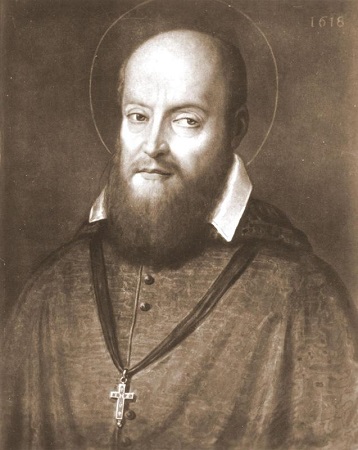
CHAPTER XIII
Sixth Meditation - On Judgment
Preparation.
1. Place yourself in the Presence of God.
2. Entreat Him to inspire you.
Considerations.
1. When the time comes which God has appointed for the end of this world, and after many terrible signs and warnings, which will overwhelm men with fear,--the whole earth will be destroyed, and nothing then left.
2. Afterwards, all men, save those already risen, shall rise from the dead, and at the voice of the Archangel appear in the valley of Jehoshaphat. But alas, with what divers aspects! for some will be glorious and shining, others horrible and ghastly.
3. Consider the majesty with which the Sovereign Judge will appear surrounded by all His Saints and Angels; His Cross, the Sign of Grace to the good and of terror to the evil, shining brighter than the sun.
4. This Sovereign Judge will with His awful word, instantly fulfilled, separate the evil and the good, setting the one on His Right Hand, the other on His Left--an eternal separation, for they will never meet again.
5. This separation made, the books of conscience will be opened, and all men will behold the malice of the wicked, and how they have contemned God; as also the penitence of the good, and the results of the grace they received. Nothing will be hid. O my God, what confusion to the one, what rejoicing to the other! Consider the final sentence of the wicked. "Depart from Me, ye cursed, into everlasting fire, prepared for the devil and his angels." Dwell upon these awful words. "Go," He says--for ever discarding these wretched sinners, banishing them for ever from His Presence. He calls them "cursed:" O my soul, what a curse: a curse involving all other maledictions, all possible evil, an irrevocable curse, including all time and eternity; condemning them to everlasting fire. Think what that eternity of suffering implies.
6. Then consider the sentence of the good. "Come," the Judge says--O blessed loving word with which God draws us to Himself and receives us in His Bosom. "Blessed of My Father"--O blessing above all blessings! "inherit the Kingdom prepared for you from the beginning of the world." O my God, and that Kingdom will know no end!
Affections and Resolutions.
1. Tremble, my soul, at the thought. O God, who will be my stay in that hour when the pillars of the earth are shaken?
2. Abhor your sins, which alone can cause you to be lost when that fearful day comes. Surely I will judge myself now, that I be not judged;--I will examine my conscience, accuse, condemn, punish myself, that the Judge may not condemn me then. I will confess my faults, and follow the counsels given me.
Conclusion.
1.Thank God for having given you means of safety in that terrible Day, and time for repentance.
2. Offer Him your heart, and ask for grace to use it well.
Our Father, Hail Mary, Glory Be.
Your prayer completed, wander back in spirit among your considerations and gather a bouquet of spiritual thoughts to perfume your whole day.
Saints from East and West

April 13 - Saint Hermenegild
Hermenegild and his brother Reccared were the two sons of the Visigothic king of Spain, Leovigild, by his first wife Theodosia. They were educated by their father in the Arian heresy, but Hermenegild married a zealous Catholic, Indegundis or Ingunda, daughter of Sigebert, king of Austrasia; his conversion to the true faith was due as much to her example and prayers as to the teaching of St Leander, archbishop of Seville. Leovigild was furious when he heard of his son's open profession of the faith, and called upon him to resign all his dignities and possessions. This Hermenegild refused to do. He raised the standard of revolt and, as the Arians were all-powerful in Visigothic Spain, he sent St Leander to Constantinople to obtain support and assistance. Disappointed in that quarter, Hermenegild implored the help of the Roman generals who, with a small army, still ruled the strip of Spanish land along the Mediterranean coast which remained in the possession of the Empire. They took his wife and infant son as hostages and made him fair promises which they failed to fulfil. For over a year Hermenegild was besieged in Seville by his father's troops, and when he could hold out no longer he fled to the Roman camp - only to be warned that those he had reckoned upon as his friends had been bribed by Leovigild to betray him. Despairing of all human aid, he entered a church and sought refuge at the altar. Leovigild did not venture to violate the sanctuary, but permitted his younger son Reccared, who was still an Arian, to go to his brother with an offer of forgiveness if he would submit and ask for pardon. Hermenegild took his father at his word and a reconciliation took place, the genuineness of which there seems no reason to doubt. Leovigild appears to have restored his elder son to some measure of his former dignities; but the king's second wife, Gosvinda, soon succeeded in estranging him once more from the unfortunate prince, and Hermenegild was imprisoned at Tarragona. He was no longer accused of treason but of heresy, his liberty being offered to him at the price of recantation. With fervent prayer he asked God to give him fortitude in his combat for the truth, adding voluntary mortifications to his enforced sufferings and clothing himself in sackcloth.
At Easter his father sent him an Arian bishop, offering to restore him to favour if he would receive communion from the prelate. Upon learning that Hermenegild had absolutely refused, Leovigild fell into one of the paroxysms of rage to which he was subject, and despatched soldiers to the prison with orders to put the young prince to death. They found him fully prepared and quite resigned to his fate. He was killed instantaneously by one blow from an axe. St Gregory the Great attributes to the merits of St Hermenegild the conversion of his brother Reccared and of the whole of Visigothic Spain. Leovigild was stung with remorse for his crime, and although he never actually renounced Arianism, yet when he was on his death-bed he commended his son Reccared to St Leander, desiring him to convert him to the orthodox faith. It is impossible to do otherwise than condemn the conduct of Hermenegild in taking up arms against his own father, but, as St Gregory of Tours has pointed out, his guilt was expiated by his heroic sufferings and death. Another Gregory, the great pope of that name, remarked of him that he only began to be truly a king when he became a martyr.

Advice You Can Bank On
A Catholic Perspective On Finances
April 2023 – Financial Lessons from Easter: Embracing Renewal and Resurrection in Your Finances
As Easter is upon us and Lent draws to a close, many of us are reflecting on the themes of renewal and resurrection. While these ideas are typically associated with spiritual and emotional growth, they can also be applied to our financial lives. By embracing the principles of renewal and resurrection, we can build a solid financial foundation that will serve us for years to come.
Here are some timeless financial lessons to consider as you reflect on Easter and the end of Lent:
As Easter reminds us to be grateful for the gift of life and salvation, practicing gratitude can also help us build a healthy relationship with money. By focusing on what we have rather than what we lack, we can avoid the trap of constant consumerism and make intentional choices about how we spend and save our money. Philippians 4:11-13 says, “I speak not as it were for want. For I have learned, in whatsoever state I am, to be content therewith. I know both how to be brought low, and I know how to abound: (everywhere, and in all things I am instructed) both to be full, and to be hungry; both to abound, and to suffer need. I can do all these things in him who strengtheneth me.” 1 Timothy 6:6-7 sums it up by telling us, “But godliness with contentment is great gain. For we brought nothing into this world: and certainly we can carry nothing out.”
Just as resurrection brings new life, being debt-free can bring a sense of freedom and renewal to your finances. While some forms of debt, such as a mortgage, may be necessary, avoiding high-interest credit card debt and other forms of consumer debt can help you build a solid financial foundation. Proverbs 22:7 reminds us perfectly, - " he rich ruleth over the poor: and the borrower is servant to him that lendeth.” Romans 13:8 also shows us by saying, “Owe no man any thing, but to love one another. For he that loveth his neighbour, hath fulfilled the law.”
Jesus' resurrection brought hope and new life to his followers, just as having an emergency fund can bring a sense of security and peace of mind to your finances. By setting aside a portion of your income each month, you can build up a cushion to help you weather unexpected expenses or financial setbacks. Once you have enough set aside for an emergency (as covered in previous months’ articles), you can begin investing that same portion of your income, as shown in Matthew 25:14-30 - The Parable of the Talents, where the master entrusted his servants with different amounts of money to invest and those who invested wisely were rewarded.
Just as Jesus sought the advice of his disciples and trusted advisors, seeking out financial advice from trusted experts can help you make wise decisions and avoid costly mistakes. Whether it's working with a financial planner or seeking guidance from trusted friends or family members, surrounding yourself with knowledgeable and supportive people can help you achieve your financial goals.
Just as Easter celebrates the ultimate act of giving, embracing a spirit of generosity can also bring renewed purpose and meaning to your finances. Whether it's donating to a favorite charity or volunteering your time and talents to a worthy cause, giving back can help you build a sense of connection and community while also making a positive impact in the world.
We hope you had a beautiful Easter Sunday with your family and loved ones. Christ is risen, hallelujah!

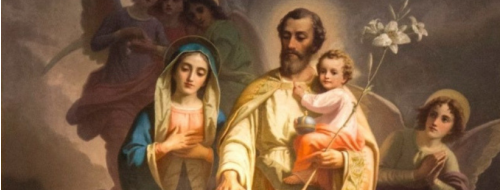 Family Matters
Family Matters
Losing a Baby And Finding Hope
Taken from the pages of the book “A Child At Any Cost” Edited and shortened for this article. If you desire a copy of the book please contact us at Vaticaninexile@gmail.com for information on how to get it.
Pregnant at Last-Part 1
I, (Mary), longed to be a mother, just like her friends. And for years I could not have a child. But Once the cause of my infertility had been diagnosed, treatment was recommended for me. Apparently it had been successful in others whose condition was similar. I was told that I needed to be committed to it as it would involve taking medicines every day plus injections combined with ultrasounds scans at times. Harry, (my husband), and I thought about all this carefully and decided to go ahead with it for a few months at least.
I did exactly what I was told to do and had all but given up on it when to my astonishment I discovered I was pregnant. I could not believe it. We were both thrilled. I went around the hose floating on air and thanking God a hundred times a day for answering our prayers in this way. I was sop happy that I did not mind the sickness or the tiredness one little bit.
When I was eight week's pregnant I had an ultrasound scan to check that everything was all right. Everything was fine-right down to my baby's tiny heart beat. I was overjoyed. My first proper antenatal examination was due when I was twelve weeks' pregnant. I would then have another ultrasound scan and so we decided to wait until after that before telling anyone other than family and a few close friends.
The day arrived for my antenatal visit. I felt well and was looking forward to being able to tell everyone our wonderful news.
Both my mother and Harry had offered to take me to the hospital. I had responded, “There's no p[point. It's purely routine. I'll be back soon!” But as I drove myself down the highway the thoughts suddenly came into my head, “What will you do if you lose the baby?” A cold shiver ran down my spine. “No that's impossible,” I told myself. “God has planned this all so well. The timing is perfect. I feel well and, after all, isn't this God's answer to our prayers? He won't let anything bad happen.”
But the thought persisted and would not go away. So I allowed myself to think about it. I began to wonder, “Is this baby more important to me than my relationship with God?” I was able to answer, “No God is more important to me.” and I turned my thoughts into prayer, “Nothing could be more important than my relationship with You, Lord. I love You-more than anyone or anything, more than my baby.” I could not know at that point how much those words were to be tested by future events.
I arrived safely at the clinic, and was examined as normal. I noticed that the midwife doing the scan was taking a long time to get a proper picture of the baby. I tried to peer over her so that I could see what was going on. I began to feel uneasy. Surely this investigation was a simple one. What could the problem be? A doctor looked at me and gently told me, “I'm very sorry....but it looks as if your baby has died.”

Lamp and Light Commentary

"Thy word is a lamp to my feet, and a light to my paths." (Psalms 119:105)
Genesis 10-11: Babylon- A Religious System And A Financial System United
In Genesis chapter 10, we see a continuation of the two streams that began with Cain and Abel-religiosity and spirituality. If these streams were atheism and spirituality, the difference between them would have been as clear as black and white. But religiosity and spirituality are like the colors cream and white. Only in bright light can the distinction between the two colors be seen clearly. The devil is a deceiver and he makes the counterfeit look as much like the genuine as possible. The gate to the broad way looks very similar to the gate of the narrow way, and a lot of people who enter through it don't even realize that they are entering the broad way. They are deceived by clever priests and preachers. We must be careful.
I am talking now about believers who are deceived. Consider just one area: How many believers really believe what Jesus said: “You cannot serve God and Money?” (Luke 16:13) Very, very few. There are multitude of so called Christians and Christian organizations who think they can serve both God and money at the same time. That's just one example of the great work that Satan has done in deceiving Christians. There are believers who love money and who imagine that they love God too, even though Jesus said that this was impossible. Such people are not spiritual but only religious..
In Chapter 10, we read of the beginning of Babylon. Its destruction is described in Revelation 18. Babylon appears at the beginning of the Bible and continues until the end of the Bible. We read here of a man named Nimrod in 10:8-9, who was a mighty hunter “before the Lord”. The beginning of his kingdom was Babel or Babylon. Babel originally meant “the gate of God.” Nimrod was not an atheist. Like Cain, he was a religious man whose profession was to lead people to God! That is how the Babylonian system works.
Babylon is a religious system (Revelation 17) as well as a financial system (Revelation 18).
Money and the work of God are joined together, and that's how Babylon is formed. And that's how people are deceived. They think they are doing the Lord's work, but they are drawn towards the work because there is money to be earned in it too! There is fame to be earned there too.
Christendom has become like that today. We see preachers today using the money given for God's work by poor people, to build expensive houses and to buy expensive cars for themselves, with a lifestyle that resembles that of film stars and not that of Jesus Christ and His apostles. We don't have to judge them, because the Bible tells us not to judge, But let us follow Jesus instead. A “Christian” religion system that brings people fame, wealth and power is certainly a Babylonian system. Babylon claims to show the “gate to God”, the very essence of what Babylon means. But it actually leads them to the gate to hell. Jesus said, “I am the door” (John 10:9). He is the door to Jerusalem, the true Church of God.
Nimrod is a type of the Antichrist, who will arise in the future. Nimrod became a leader in the know world of his day. The Antichrist is going to be like that in the last days. He is going to deliver people in some amazing way and will thus earn the respect of many. In revelation, we read that a false prophet will be very closely joined together in the last days. We see that at election time in the United States. Political leaders know that using the religious card will get them more votes. Even the “Christian religion” is used by politicians for promoting themselves. But that is not the faith of the Jesus Christ. Jesus said, “My kingdom is not of this world” (John 18:36). That is the identifying mark of the true faith. You could never get Jesus or His apostles to be secular kings like Nimrod was. They were servants. Once when they tried to make Jesus a king, He ran away from their midst. He would not be their king.
In 11:4, we read that the people of the world decided to build a tower. They said to each other, “Come, let us make a city and a tower, the top whereof may reach to heaven”. They wanted their tower to be the gate of God (Babel). Human effort to reach God is a major constituent of false religion.
False religion is always a religion of our own works and not one of faith and dependence on God and the works he wants to do through us.
The leaders of false religion are always strong personalities with the charisma of film stars. They are not weak, unimpressive men like Peter. Most of the leaders of the Catholic Church today are people who seek fame and honor for themselves. The true prophet of God however are always misunderstood and called “heretics” and cast out by the counterfeit Catholic Church. That's what happen to Jesus and the apostles in their day by the counterfeit religious of their day.
There can be a lot of unity in Babylon. It says here that the whole earth used the same language (11:1). Not just the same language in terms of speech, but also the same language of human cleverness, human ability and human glory. That is the language spoke by the world and that unfortunately is the language spoken by many of the Catholic hierarchy today. Jesus Christ, however was crucified “through weakness”, II Corinthians 13:4, and “no beauty in him, nor comeliness, no sightliness”, Isaiah 53:2 that people “would be desireth”, of Him. He was a servant Who washed people's feet. He called Himself an ordinary man...a son of man. These are the identifying marks of a true servant of God.
In Babylon they say, “Come let us build.” They don't need to consult God about such matters. They could build the gateway to heaven themselves! Those, as well, of a false Catholic religion does not depend helplessly on God for its every need.
They may pray. All religions have prayer, but it will be meaningless prayer. The prophets of Baal prayed for hours on Mount Carmel, but nothing happened. Elijah prayed for one minute and the fire of God fell from heaven! Some of us may glory in the fact that we pray every decade of the rosary every day of the week. That may be good. Jesus spent all night in prayer also. But prayer has value only if it is an expression of our helpless dependence on God for His guidance and help. Babylonians however do not need to seek God's will, for they depend on human cleverness. False religion begins with man, not with God. It's motto is: “In the beginning Man,” not “In the beginning God.” false religion originates in humanistic theology it is done through man's power and it is propagated for man's glory.
The scriptures speak about a church foundation, where built on it are people that are wood, hay and stubble or people that are gold, silver, and precious stones. (I Corinthians 3:12)
Babylon is built by man's ideas. A lot of so called Christian ministries, and Denominations, Dioceses and Parishe hierarchy are doing their work today through human ideas and not God's. They follow the principles of multinational companies and large business corporations, rather than the teaching of the apostles. They run their organizations like business enterprises and not like the Churches and ministries that the apostles built. Why didn't Jesus give his apostles to a marketing agency? Wouldn't they have done a better job than those twelve apostles? But that would have been man's methods. God's methods are different.
Very few people know God's methods, because very few people know God. Man is a religious creature and he would rather have religion than God. It is uncomfortable to live with God. It is comfortable to live with religion. You cannot live with God and be a great man in the world. But you can have the “Christian religion” and still be a great man. People don't want God. Many Catholics would rather have a pre- 1960 Catholic religion than God himself. Others want a Catholic religion that is new...easier...updated and more modern than to have God himself. They don't want the yoke of Jesus Christ on their necks.
Babylon is built through man's power. It does not need the Holy Spirit's anointing or the supernatural gifts that God gives.
With natural gifts, good music and electronic gadgets, the job can be done! No wonder our work for God is of such poor quality! We do not know the power that the early apostle knew. The baptism in the Holy Spirit that many people claim to have experienced today, I am convinced is a counterfeit baptism of their own human emotions and experiences-a psychological experience that satisfies them but far removed from what the disciples received on the day of Pentecost. Few today are experiencing that genuine anointing of the Holy Spirit that first came upon Jesus and the apostles. I would urge you to seek for that genuine enduement with power that is available to you since your confirmation. Or maybe, for what ever reason, you have never received the sacrament of confirmation. I would encourage you to seek to be confirmed in the Church. It is only through the initial grace of this sacrament can we have that power that Jesus promised his apostles before He ascended to heaven. And then we must continue to seek Gods power in our lives so that we can truly serve God. Why do I say that a lot that goes on today in the name of the Holy Spirit is counterfeit? Because Jesus said that we would be able to identify false prophets by their fruits. The love of money is so glaringly obvious in most of those who claim to be baptized in the Holy Spirit today. Such fruit is certainly not from God, for the Holy Spirit is not a lover money. These people love power, position, and honor of men. These are not the fruit of the Holy Spirit. . Then their power must be coming from some other source, from some other spirit.
Babylon is built for man's glory. “let us make a name” is what we read in 11:4. Years later, we read in Daniel 4:30 that Nebuchadnezzar looked over the city of Babylon that he had built. I have heard that it was built as a square, 15 1/2 miles long and 151/2 miles wide, with walls that were 87 feet thick and 350 feet high. It had a beautiful hanging garden that was one of the wonders of the world. And Nebuchadnezzar said, “Is not this the great Babylon, which I have built to be the seat of the kingdom, by the strength of my power, and in the glory of my excellence?” It was built from man through man and to man. Nebuchadnezzar lived about 2000 years after the building of the tower of Babel. But he had the same spirit. 2500 years after Nebuchadnezzar, we find the same spirit in operation in the Catholic Church today. This is what Babylon is-from man, through man and to man. It is the very opposite of Jerusalem.
We read in 11:5 that “And the Lord came down to see the city and the tower, which the children of Adam were building.” Remember that the Lord will come down to examine whatever we build. He does not come down to examine the size of the Church. But the motive with which it is being built. For whose glory was it built? If he was examining the size of the tower of Babel, it was very impressive. But God came down looking for something else at that time. And He come down looking for something else today as well.


Books to feed your faith!
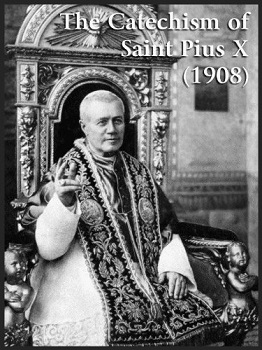
Catechism of Saint Pius X
$14.95
The Fathers of the Council of Trent showed at a very early date that they were satisfied with none of the existing works, and that they were fully alive to the need and necessity of preparing an authoritative Catechism. The realisation of their desire, however, was retarded for several years by events over which they had little control; and when the work was finally taken in hand another idea prevailed, resulting in the publication of a manual for the use of the clergy, and not, as originally suggested, a Catechism for children and uninstructed adults. Of the countless Catechisms that continued to appear, two — those of Bellarmine and Canisius — have steadily held their ground ever since, and to a large extent have served as the models of nearly an subsequent compilations of the kind. The influence of Canisius, however, has on the whole been limited to Germany; whereas Bellarmine's Catechism , which was written by command of Pope Clement VIII in 1597, has been copied in almost every other country in the world. At an early date it was translated into Arabic, Latin, Modern Greek, French, Spanish, German, English, and Polish. It had the warm approbation of Clement VIII, who prescribed it for use in the Papal States; of Urban VIII, who directed it to be adopted in all the Eastern missions; of Innocent XIII and Benedict XIV; particularly of the very important Council of all Italy, held at Rome, in 1725, which made it obligatory in all the dioceses of the peninsula; and finally of the Vatican Council which indicated it as the model for a proposed universal Catechism. Though Bellarmine's Catechism was largely followed as a model all over the world, yet, owing to the modifications introduced in diocesan editions, it came to pass in the course of time that almost every diocese had its own Catechism, differing in many respects from the Catechisms of other dioceses. The obvious inconvenience of this bewildering multiplicity of Catechisms occupied the attention of the Fathers of the Vatican Council, the great majority of whom were agreed as to the desirability of having a uniform small Catechism for the faithful all over the world. Early during the sittings of the Council, forty-one of the assembled Fathers devoted six sessions (February 10 to February 22) to an examination of the question; and the report which they drew up occupied the attention of the whole Council during the sittings of April 29 and 30. The question being put to a vote on May 4, an immense majority was found to be in favour of the compilation of a small uniform Catechism, to be compiled in Latin, translated into every language, and made obligatory in every diocese. But the approach of the Italian troops towards the walls of Rome brought the Council to an untimely end and there was no time to promulgate the constitution on the proposed uniform Catechism, so that it has not the force of law. The idea, however, has never been lost sight of. During the sitting of the first Catechetical Congress in 1880, the then Bishop of Mantua (later St. Pius X) proposed that the Holy Father be petitioned to arrange for the compilation of a simple, plain, brief, and popular Catechism for uniform use all over the world. Shortly after his elevation to the Chair of Peter, Pius X at once set about realising, within certain limits, his own proposal of 1880, by prescribing a uniform Catechism — the Compendium of Christian Doctrine — for use in the dioceses of the ecclesiastical province of Rome, at the same time indicating that it was his earnest desire to have the same manual adopted all over Italy. The text selected was, with slight modifications, that which had been adopted for some years by the united hierarchy of Piedmont, Liguria, Lombardy, Emilia, and Tuscany.

The Little Office of the Blessed Virgin Mary
$14.99
Originally published in 1915, this work is in conformity with the Decrees in place for the Little Office before Vatican II, which is the Traditional Little Office. The Little Office of the Blessed Virgin is one of the liturgical prayers of the Church, and she imposes it "on many of her children. Although the Little Office of Our Lady is considerably shorter than the ever-varying Office which the Clergy and Religious in solemn vows have to say, yet, coming as it does from the same authority, it is as much a liturgical prayer as the . Divine Office, and has the same claims to be considered a part of the official worship which the mystical Spouse of Christ, the Church, daily offers to her Divine Head. Prayer is the great duty of man here below: " We ought always to pray and not to faint" (Luke xviii. I). We appear before God under three different aspects: as individuals, as members of congregations or societies, and as members of a Divine Society. Hence there are three kinds of prayer: (I) private prayer, (2) prayer in common, and (3) the prayer of the Church, or liturgical prayer. Of the first kind, private prayer, Our Lurd spoke when He said: "But thou when thou shalt pray, enter into thy chamber, and having shut the door, pray to thy Father in secret, and thy Father who seeth in secret will repay thee" (Malt. vi. 6). The second kind, prayer in common, is that which we offer as members of congregations or societies. The prayers said by the members of a family, such as morning and night prayers, the prayers said together by the members of a congregation or a community, are better than individual prayers. Our Lord praised this kind of prayer when He said: "If two of you shall consent upon earth, concerning anything whatsoever they shall ask, it shall be done to them by My Father who is in heaven. For where there are two or three gathered together in My Name, there am I in the midst of them " (Matt. xviii. 19, 20). The third kind, liturgical prayer, is much more pleasing to God; it excels both private prayer and prayer in common. It is the prayer we offer as members of a Divine Society, the Holy Church. The public prayer of the Church may be looked upon as the public act of the whole body of the Church. Those who by their Rule, approved by the Church, are charged with saying the Office, whether it be the Divine Office or the Little Office of the Blessed Virgin, say it as public officers of the Church, who officially stand before the throne of God and make intercession for the whole body of Christ's Church. When performing this duty, even when alone, they cease to be private individuals; they are invested with the public character of ambassadors to the heavenly Court. But an ambassador's personal merit is of very secondary concern: What does matter is the dignity and power of him who sent the ambassador, and whom he represents. Those who take part in this public Office do not stand before God in their own name, nor yet in the name of the faithful assembled, but in the name of the Holy Church appointed by God. Her service and prayer do not partake of the worth and devotion of the .angels, but of the worth of the mystical body of Christ. This prayer of the Church is the most excellent of prayers. Private prayer and prayer in common are doubtless very good, and highly pleasing to God; but they are human prayers, necessarily defective, made and said by men who are sinners, and not always altogether pleasing to God.
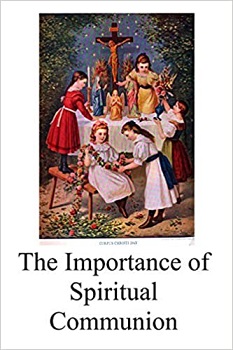
The Importance of Spiritual Communion
Kindle $2.99 / Paperback $5.99
If we cannot receive Holy Communion actually, then let us do so spiritually. These prayers and instructions have been gathered from the Saints and other venerated spiritual writers. Spiritual Communion has been a part of the spiritual life for decades. Growing up I was instructed to make a Spiritual Communion, when I could not go to Communion such as when I assisted at a second Mass. The same is true if one finds oneself at Mass, but not fasting. There are times coming, when it will be difficult, if not impossible to assist at the Holy Sacrifice of the Mass. We should be prepared for such times.

Easter Meat Pie

Prep: 45 minutes
Cook: 1 hour
Ready In: 1 hour 45 minues
Ingredients
4 (9 inch) unbaked pie crusts
2 pounds ricotta cheese
6 eggs
8 ounces mozzarella cheese, grated
1 pound cooked ham, chopped
1/2 pound Genoa salami, chopped
1/4 pound prosciutto, chopped
1/4 cup grated Parmesan cheese
Directions
Preheat oven to 325 degrees F (165 degrees C).
Place ricotta in a large mixing bowl and add eggs one at a time while mixing on low speed. Stir in mozzarella, ham, salami, and prosciutto until all ingredients are well combined. Line two 9 inch pans with pastry. Spoon half of mixture into each pan. Sprinkle half of the Parmesan cheese over each pie, then cover with top pastry. Crimp edges and cut steam vents in tops.
Bake in preheated oven for 1 hour, until crust is golden brown. Cool on racks.
Paska Bread

Prep: 30 minutes
Cook: 50 minutes
Ready In: 6 hours 40 minutes
Ingredients
For the Sponge:
2 (.25 ounce) packages active dry yeast
1/2 cup warm water (110 degrees F/45 degrees C)
1/2 cup white sugar
3 cups warm milk
4 cups all-purpose flour
For the Dough:
6 eggs, beaten
1/2 cup white sugar
1 cup butter, softened
1/4 teaspoon salt
1/4 teaspoon lemon zest
12 cups all-purpose flour
1 egg
1 tablespoon water
2 tablespoons butter, melted
Directions
Proof the yeast in 1/2 cup warm water in a large bowl until slightly frothy.
In the meantime, dissolve 1/2 cup sugar in the warm milk; allow to cool to lukewarm. Once cooled, add the milk mixture to the yeast mixture along with 4 cups of flour. Mix well with a wooden spoon. Cover and put in a dark, warm place until the mixture is bubbly and doubled in size, about 2 hours.
Stir in the beaten eggs, 1/2 cup sugar, 1 cup butter, salt, and lemon peel. Stir well to blend. Begin adding the remaining flour a cup at a time to form a very soft dough.
Knead the dough on a floured board until soft and elastic, about 10 minutes. Place the dough in a greased bowl, turning to coat all sides. Cover bowl with plastic wrap and allow to rise in a warm place until doubled, about 2 hours. Punch dough down, and allow to rise again for 30 minutes.
Divide dough into three parts (see Cook's Note). Shape into slightly rounded loaves, and place on greased baking sheets. Let rise until doubled, about 45 minutes to 1 hour. Beat 1 egg with 1 tablespoon water; brush onto loaves.
Preheat oven to 350 degrees F (175 degrees C).
Bake in preheated oven until loaves are deep brown, 45 to 50 minutes. Once they are done, brush the tops with melted butter for a soft crust.
Video sermons and instructions: Timeless timely truths for living the Faith
Easter Sunday 2011
Easter 2013
One Flock
Third Sunday after Easter 2013
Vatican In Exile Podcasts
Family Theater
Family Theater was a program created to promote family unity and each week saw a drama illustrating the importance of family life and prayer. The main reason for the success of this series was undoubtedly due to the numerous Hollywood stars that participated.
Cast: Bing Crosby, Gary Cooper, James Stewart, Gregory Peck, Shirley Temple Director: Fred MacKaye, Dave Young, Joseph Mansfield, Richard Sanville, Jaime del Valle, Mel Williamson, Robert O’Sullivan, John Kelley Producer: Father Patrick Peyton, Bob Longenecker Host: Father Patrick Peyton Writer: True Boardman , Father Patrick Peyton Announcer:Tony LaFrano
Ranger Bill
Ranger Bill was a Christian radio adventure serial, and aimed at the younger generation. This turned out to be one of the most successful radio broadcasts, and with an amazing longevity of over twelve years. The very first fifteen minute episode was aired on October 2, 1950, but this later changed to a half hour episode, beginning May 14, 1954 and running right through until 1962.
Catechism Corner
Catechizing with a fresh perspective. Using the Holy Scriptures and the Catechism of the Council of Trent as foundational bases.
Lamp and Light Bible Study
Lamp and Light Bible Study is not a ‘theological’ study but a ‘life application’ study.
Our in house Priest will show that every single book of the Bible is interesting and has a message for us today. It deals with key aspects of the Christian life and speaks more to the heart than to the head.
Sunday Sermon
The Ave Maria Hour
The Ave Maria Hour first aired on April 26, 1935, on radio station WOR. It was presented by the Franciscan Friars of the Atonement to help the humanitarian work of St. Christopher’s Inn, and during that first show, Servant of God Father Paul of Graymoor talked about the charity involved in caring for the men of the Inn. In 1937, it was estimated that nearly 1 million listeners were tuning in each week, which resulted in large pilgrimages coming to Graymoor.
The popular Ave Maria Hour continued until 1969, encouraging and entertaining listeners. It was heard on more than 350 stations as well as on the Armed Forces Radio Service. Recorded in a studio in New York City and on the grounds of Graymoor, these dramatizations of the lives of the saints, stories from the Gospel, and inspiring accounts of faith received many awards for religious radio programs sponsored by the American Exhibition of Educational Radio and Television programs of Ohio State University. It received the Golden Bell Award in 1959, presented by Ed Sullivan on live television.
The Bible In Living Sound
THE BIBLE IN LIVING SOUND, the original dramatized audio Bible stories . . . really gets kids excited about the Bible! These 450 spiritually enthralling stories, re-enacted with music and lively sound effects, leave impressions of lasting beauty and wonder, putting the listener in the Red Sea at the crossing, beside David as he confronts Goliath, with Mary and Joseph in the stable, and there at the foot of the Cross. These stunning dramatizations captivate listeners of all ages as they are enriched by visualizing the values taught in God's Word. Listeners want to hear these audio Bible stories again and again.

When Is a Day a Day ?
As we look at each of the six days of creation, I am going to give you some important information so you can know that these days were ordinary days of approximately 24 hours, just as we have today. This is important, because some Christians think these six days of creation in Genesis could be millions of years long and were not ordinary days at all. Usually people who say this do so because they think scientists have proved the earth to be billions of years old. As I said earlier, scientist have not proved this at all.
There are many scientists who have investigated evidence that confirms the earth being only thousands of years old. However, the ultimate “evidence” is the Bible itself, as it is God's record of history for us.
Because God is perfect, and He does not ell a lie, and He is the only one who knows everything, it is important that we accept His Word as truth. If you take God at His word, it is obvious that each of the days of creation are ordinary days. God communicates through language. When He made the first man, Adam, He had already “programmed” Adam with a language so there could be communication. Human language consists of words used in a specific context that relates to the entire reality around us. Thus, God can reveal things to man, and man can communicate with God, because words have meaning and convey an understandable message. If this were not so, how could any of us communicate with each other or with God?
The Old Testament was originally written in the Hebrew language. The Hebrew word for “day” in Genesis chapter one is yom.
What does the Bible tell us about the meaning of “day” in Genesis 1? A word can have more than one meaning, depending on the context. The reason it is necessary to understand this is because words do have different meanings, and it how they are used that determines which meaning is the correct one. The manner in which words are used in the Bible determine exactly what they mean, because many words can have more than one meaning. Even the word day (yom) can have a number of different meanings, but as we will see, the way it is used in Genesis chapter 1 tells us that it means an ordinary day.
Now the English word “day” can have perhaps 14 different meanings. For example, consider the following sentence. “Back in my grandfather's day, it took 12 days to drive across the country during the day.”
Here the first use of “day” means “time” in a general sense. The second “day”, where a number is used, refers to an ordinary day of 24 hours, and the third refers to the daylight portion of the 24 hour period. The point is that words can have more than one meaning, depending on the context.
To understand the meaning if “day”, “yom”, is used in the context of Scripture. Consider the following:
-
A typical Hebrew dictionary will illustrate that yom can have a range of meanings: a period of light as contrasted to night, a 24 hour period, time, a specific point of time, or a year.
-
A classic, well respected Hebrew-English dictionary (Brown, Driver, Briggs) has seven headings and many subheadings for the meaning of yom-but it defines the creation days of Genesis 1 as ordinary days under the heading “day as defined by evening and morning.”
-
A number and the phrase “evening and morning” are used with each of the six days of creation (Genesis 1:5,8,13,19,23,31).
-
Outside of Genesis 1, yom is used with a number of over 410 times and each time it means an ordinary day. Why would Genesis 1 be the exception?
-
Outside of Genesis 1, yom is used with the word “evening” or “morning over 23 times. “Evening” and “morning” appear in association, but without yom, at lest 38 times. All 61 times the text refers to an ordinary day. Why would Genesis 1 be the exception?
-
In Genesis 1:5, yom occurs in context with the word “night.” Outside of Genesis 1, “night” is used with yom 53 times, and each time it means an ordinary day. Why would Genesis 1 be the exception? Even the use of the word “light” with yom in this passage determines the meaning as an ordinary day.
-
The plural of yom, which does not appear in Genesis 1, can be used to communicate a longer time period, such as “in those days.” Adding a number here wouldn't make sense. But, in Exodus 20:11, where a number is used with “days,” it is referring to the six earth-rotation days of the creation week.
-
There are words in biblical Hebrew (such as olam or qedem) that are very suitable for communicating long periods of time, or indefinite time, but none of these words are used in Genesis 1.
From the meaning of the word for day in Hebrew and how it's used in genesis 1 for each of the six days of creation, it is very clear they are six ordinary days of approximately 24 hours each.

Catechism Catch-Up
Wives, Be in Subjection to Your Own Husbands

God’s plan for the wife in the home is that the wife is to take a subordinate role in leadership issues and/or when decisions need to be made. This is a general principle and each couple needs to find their way in working with the personality and gifts of both husband and wife. This direction from God is often a considerable challenge for the wife.
Women are often quicker in their response than their husbands. Sometimes they think more quickly or just put their thoughts into words more rapidly. It can be their opinion that because they can respond more quickly, then they must be more intelligent than their husbands.
Wives are called to “rule the house.” Since house management is on their minds almost all the time, they will see needs more quickly than their husbands. Since they see the things that need repair and their lives are hindered by their needs, they may feel their husbands lack intellectual capacities because they don’t quickly respond to these needs.
Mothers also have to live with more fears. When they see their offspring engage in activity that appears frightening, they may be afraid the child is in serious danger. When their husbands do not rescue or stop the child, their fears escalate rapidly and they may wonder why their husbands are so slow.
Some women have a good bit more sense when it comes to handling money. Perhaps by nature or training, they have a sense of good business practices. It may be easy for them to “run over” their husband’s judgment.
Children, youth and bystanders are observing how women respect their husbands. Foundations are being laid that future generations will build upon. It is always good to remember that the overall plan of God is more important than one’s immediate pleasure or preference. By faith we will find our way.
Is there a way a woman can “grow” leadership in her husband? Can a woman find wisdom from God on how to help him assume leadership?
The Bible is God’s answer to every situation. This lesson is an effort to help women and their husbands find answers to the questions of leadership.
“... and let the wife fear, that is to reverence and have respect for her husband.” Ephesians 5:33b
Submission and reverence are twin virtues that grace a godly woman.
Every woman wishes to be attractive. But physical favor and beauty are short lived. It is spiritual character that causes a woman to be highly treasured by both her husband and family. These virtues are not native to a woman’s nature. She needs to receive these virtues through self-discipline and a close walk with God.
Submission includes women seeing themselves as being second in command to their husbands.
In a later lesson we will consider that women are to be creative and resourceful in their domain. This must be balanced with the fact that in the home, in social institutions and in the church, God is asking men to lead.
In the workplace, there may be times when a woman, especially one without a husband, has a responsibility given her that is over men. With a spirit of humility she can fulfill her role without being domineering. The home is the place where women can best show their respect for their role, their Creator and their husbands. By being thankful to their husbands for what they are able to provide and then making each resource go as far as possible, godly women grace a home in ways not native to men.
Reverence shows up in attitude, countenance, speech and actions.
A woman who sees herself as being subordinate to her husband because of God’s plan, will reveal this in the thousands of expressions of life. Her respect will especially be shown through the way she looks at him, accepts his decisions and speaks to him.
While each man has a lot of boy left in him, one of the things he is sensitive to is whether he is treated as a little boy. Deep in his heart he craves respect and honor. When his wife reverences him, a deep need is met in his heart to love her in return. A godly man will accept the fact that his wife has a carnal nature and love her even when she does not respect him.
When she chooses respect, it naturally brings out the leader in him. A wise man will seek his wife’s counsel. He will discuss the problem he is facing, the decision he needs to make, and see what her feelings are on the matter. This is especially true when it relates to matters about the house, but also true in matters regarding his work and social world. She is his help meet, a help suitable for him in each issue and problem he is facing.
Submission also carries the responsibility to try to make the husband’s wishes prove successful.
A woman’s intuition and knowledge of her man can often give her a fairly certain prediction about her husband’s venture. She should share her judgment on the matter at hand. But once he has made a decision, there is no virtue in being critical and continuing to oppose her husband. This is the time when she needs to put her shoulder to the wheel and help to push.
A woman can often make or break a project. The husband is already endeavoring to make his decision succeed. If the wife gives her support, it might just be the momentum to help the idea or task go forward. If she opposes it, it will wound her husband deeply and may cause the project to fail. A woman who opposes her husband often just opposes herself.
What then if she tries to help him and it still fails, just as she could have told him? Even then she should stand by her husband. It doesn’t take vision to stand by a man when he is successful. It takes a woman of vision and love to stand by her husband when the world would call him a failure.
The ornament of submission is high on God’s value list, being the only ornament He wants godly women to adorn themselves with.
It is native to a woman’s heart to seek jewels. Some girls from toddler days will notice if mother adorns their hair with barrettes that match their dress or bring out the color of their eyes. Older women still seek rich adornment, hoping it will somehow make them look attractive.
God says it is something else that He sees as ornamentation. He is watching for women who want to adorn themselves with good works and with a submissive attitude.
God’s value system will last for eternity. Godly women will receive their due reward someday. Their crowns will never perish.
A Christian wife should seek to win her unbelieving husband with godly choices and no scolding.
Probably there is no instrument as easy to use and as perverse as the tongue. When a woman has a deep spiritual concern for her husband, the tongue is something she will need to give careful attention to.
According to many translators, what Peter wrote to wives of unbelieving husbands was that they were to win their husbands without a word. Not one word of scolding or of preaching. They are to simply give love and be meek of spirit.
God knows how to reach deep into the heart and life. When a woman of faith chooses to place her confidence in what God says is the right plan, then she becomes a partner with God. God can then activate His Holy Spirit to work in His own powerful way.
It is man’s nature to be sensitive to how his wife views his actions.
No hurt goes as deep in the soul of a man as to be belittled by his wife. If that belittlement is in the presence of others, or if the belittlement was over something the husband felt he should have been praised for, then the wound will be doubly hurtful.
A wise woman will respond to this knowledge with wisdom. She knows not to hurt the man she loves, even if the hurt does not seem to her to be that big of an issue. She also will know to go out of her way to express her appreciation and respect for the areas where she sees him putting his heart into his walk with God. A man naturally wants to grow in the areas where he senses he has his wife’s admiration.
Most women are sensitive to whether or not they are loved. Men are equally sensitive to whether or not they are respected. It does wonders for a marriage when a woman decides to look up to her husband as her lord and protector.
A wife should never obey her husband in doing something that is morally wrong. Rather she should appeal for permission to do right.
The teaching of godly submission is strong. However, we also must take the example or illustrations of Scripture and learn from them. We do not know if the deceit was Ananias’ idea or Sapphira’s. The only thing we know is that Sapphira was under Ananias’ authority, that she had his support and blessing to practice deceit. That blessing did not protect her.
Godly women will want to remember Peter’s word to the Jewish leaders. “We ought to obey God rather than men.” When leaders’ directions do not contradict God’s commands, we submit. When their direction is sin, we will suffer rather than go against God’s directives.
In Christ and in eternity, women are equal with men. Women who have served Christ in humility may well be given honor above men in Christ’s kingdom.
Time will soon come to an end. The structure of society will come to an end with it. Jesus taught us that the first would be last and the last first (Matthew 19:30). We all know that in the ladder of importance, godly womanhood is often relegated to the lowest positions. That’s the position Jesus took too, the lowest levels.
His promise is that those who served in His Name will not lose their reward. We know He will keep His word.
When we find ourselves fitting into the plan our Creator has for us, we will have the greatest fulfillment possible for any created being. May God bless our lady's who willingly take their part in the home and church. Great will be their reward in heaven some day. Also, God bless the wives who keep the vision alive that submitting to an imperfect husband is their pathway to pleasing God and having a happy husband.
READ MORE FROM THE TRADITIONAL CATECHISM AT THE WEBSITE: traditionalcatechism.com
Living Catholic:
Seven Basic Principles That Govern our Personal Lives and Relationships

These seven principles are:
design, authority, responsibility, suffering, ownership, freedom, success
Just as there are universal laws that govern the world of nature, there are basic principles that govern our personal lives and relationships. These seven Biblical principles apply to every person, regardless of culture, background, religion, age, education, or social status.
An understanding of these principles can bring insights into the cause-and-effect sequences of life. Consequently, individuals can become equipped to make wise choices and avoid failure.
Design
God has a precise purpose for each person, object, and relationship that He creates. As we understand and live in harmony with His design, we will discover self-acceptance, identity, and fulfillment in life.
Authority
God assigns various responsibilities to parents, church leaders, government officials, and other authorities. As we learn to acknowledge and honor these authorities, we can see God work through them to provide direction and protection in our lives. Honoring our authorities brings inward peace.
Responsibility
God holds us accountable for every word, thought, action, attitude, and motive. When we offend others, asking for forgiveness and making proper restitution are essential steps to maintaining a clear conscience.
Suffering
The hurts of offenders can reveal our “blind spots.” God grants us grace for personal cleansing, growth, and achievement as we learn to respond with full forgiveness to those who offend us.
Ownership
Everything we have has been entrusted to us by God, and we are to use these resources wisely. Yielding our personal rights and expectations to God brings true security and enables us to overcome anger and worry.
Freedom
Godly freedom is not the privilege to do what we want; rather, Godly freedom is the power to do what is right. Regaining ground that has been surrendered to sin brings moral purity, equipping us to serve others in genuine love.
Success
We can discover God’s purpose for our lives by engrafting Scripture into our hearts and minds, using it to “think God’s thoughts” and to build a foundation for making wise decisions.
To Learn More Principles For Life Go To: Resources: Principles of Life

Enjoying the Olive Tree? Why not subscribe today? Click here to go to the FREE scubscription page!


- Please continue to pray for the repose of the soul of the Holy Father, Pope Michael.
- Your prayers and support are asked for the House of Prayer.
- Your prayers and support are asked as we prepare for the purchase of one of several possible parcels of land for the growth of the Church.
- Your prayers and support are asked in a practical way for our domestic missionary work: our vehicles are in need of maintenance and repair! Can you help?
- Please pray for the health of Deacon Stephen and his dear wife.
- Be sure to keep St. Helen Catholic Mission in your prayers. Why not go on over to the site now and see what they have to offer and how you might be able to help!
- We are all praying especially for you, too. May you correspond with every grace of God!
- In what other needs or intentions may we pray for you? Let us know!
- Let us remember that the Church runs on prayer. Without your prayers, God will not work in hearts and souls to bring them to a knowledge of the truth. (I Timothy 2:4)


To Donate online go to:
Donations

To Donate by Mail:
Our address is
Vatican in Exile
423 NE Grattan ST
Topeka, Kansas 66616
Make Checks payable to:
Vatican in Exile






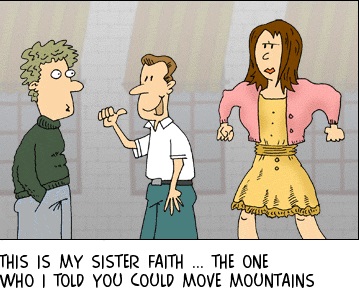







 Follow
Follow


